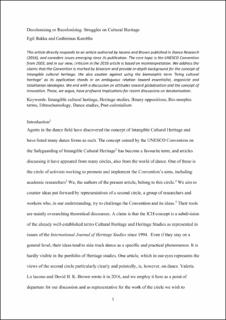| dc.contributor.author | Bakka, Egil | |
| dc.contributor.author | Karoblis, Gediminas | |
| dc.date.accessioned | 2022-10-19T06:56:13Z | |
| dc.date.available | 2022-10-19T06:56:13Z | |
| dc.date.created | 2021-11-11T19:57:18Z | |
| dc.date.issued | 2021 | |
| dc.identifier.citation | Dance Research. 2021, 39 (2), 247-263. | en_US |
| dc.identifier.issn | 0264-2875 | |
| dc.identifier.uri | https://hdl.handle.net/11250/3026878 | |
| dc.description.abstract | This article directly responds to an article authored by Iacono and Brown published in Dance Research (2016), and considers issues emerging since its publication. The core topic is the UNESCO Convention from 2003, and in our view, criticism in the 2016 article is based on misinterpretation. We address the claims that the Convention is marked by binarism and provide in-depth background for the concept of intangible cultural heritage. We also caution against using the biomorphic term ‘living cultural heritage’ as its application stands in an ambiguous relation toward essentialist, organicist and totalitarian ideologies. We end with a discussion on attitudes toward globalisation and the concept of innovation. These, we argue, have profound implications for recent discussions on decolonisation. | en_US |
| dc.language.iso | eng | en_US |
| dc.publisher | Edinburgh University Press | en_US |
| dc.title | Decolonising or recolonising: Struggles on cultural heritage | en_US |
| dc.type | Peer reviewed | en_US |
| dc.type | Journal article | en_US |
| dc.description.version | acceptedVersion | en_US |
| dc.source.pagenumber | 247-263 | en_US |
| dc.source.volume | 39 | en_US |
| dc.source.journal | Dance Research | en_US |
| dc.source.issue | 2 | en_US |
| dc.identifier.doi | 10.3366/drs.2021.0345 | |
| dc.identifier.cristin | 1953824 | |
| cristin.ispublished | true | |
| cristin.fulltext | postprint | |
| cristin.qualitycode | 1 | |
